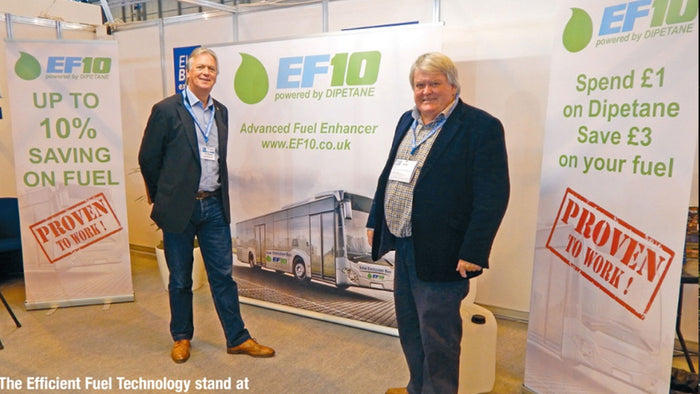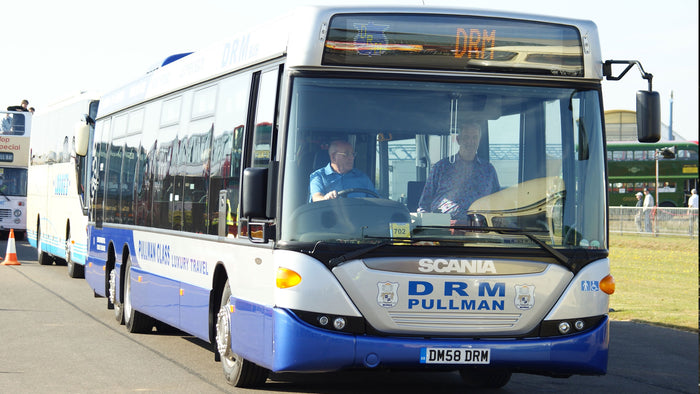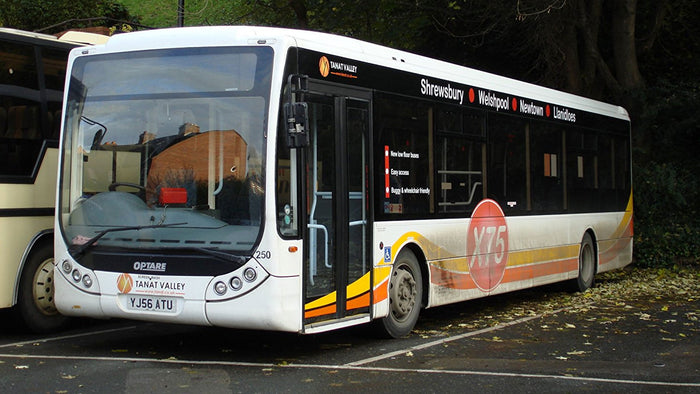EF10 article by Bus & Coach Buyer Magazine

The industry rightly focuses on getting the most from its fuel through initiatives such as driver performance monitoring, hybridisation and additives but does the fuel itself deliver the most it can? All fuels used in motor vehicles, whether petrol or diesel, are produced to high standards such as the European based standard BS EN590 for diesel fuels, however they still possess a variety of molecular structures in their make up which prevent complete combustion during the engine’s cycle. The result is unburnt carbon that leads to deposits, loss of performance and emissions which require treatment to minimise environmental impacts. A variety of post combustion fuel treatments have been on the market for many years, however these tend to focus on treating the products of combustion, including the deposits and may contain polluting materials themselves.
An Irish Journey
Back in the 1980s, research scientists in Ireland took on the challenge of reaching as near complete combustion as possible without additives containing non fuel components. Their objective was to improve the molecular structure of the carbon chains in the fuel pre combustion such that it could be burnt more completely and deliver its full energy value, referred to as ‘best practice combustion.’ The outcome of this research in 1986 was Dipetane, a hydrocarbon based pre combustion fuel treatment.
Why Dipetane works
Dipetane is a non-toxic, non-hazardous, odourless and nearly clear liquid that contains nothing that is not already in the fuel thus maintaining compliance to BS EN590 and ensuring there is no impact on vehicle warranties. It is manufactured exclusively by Dipetane International Ltd in County Wicklow, Ireland to a formula which cannot be reverse engineered. By adding Dipetane to any fuel; petrol, diesel including bio-diesel or heating oil, it rearranges the molecular structure of the carbon chains prior to combustion such that significantly improved combustion of the fuel can be achieved. It equalises and stabilises the carbon chains enabling all of the incoming 21 units of oxygen in the air to attach to and burn the carbon chains, thereby enabling more complete combustion. The result is more power delivered during combustion and hence lower fuel usage together with a reduction of carbon deposits in the engine, less impact on post-combustion treatment systems such as catalytic converters and DPFs, and lower harmful emissions NOx by up to 30%.
Dipetane is added to fuel at a rate of 1litre per 2001itres and the manufacturer claims that, on average, this dosage rate will result in a 10% improvement in fuel efficiency, a 50% decrease in smoke emissions and a 25% decrease in greenhouse gas emissions,
CO2 by up to 15%. It is self-mixing with the fuel, has an ignition point of 195C and a minus 34C pour point which also helps with cold starting problems. It has its own lubricity which supports compensation for the lower sulphur levels in modern fuels and is claimed to be particularly helpful in ensuring complete combustion of lower carbon biofuels. The product was first insured for product liability in 1992 and has had a 100% claim free record since that time.
Real Life Experience
Since its introduction in 1986, Dipetane has developed a significant user base in Ireland, UK, Australia, New Zealand, Chile, China and the USA. An early success story was the sale of pretreated fuel under the ‘Cleanburn’ name on an exclusive basis by Belfast based Kelly Fuels. Exhaustive testing has been carried out in all countries where Dipetane is sold and the company has a large portfolio of case studies covering both cars and commercial vehicles. These demonstrate both fuel saving and environmental benefits, for example a number of taxis which failed Ireland’s equivalent to the MOT test on smoke emissions were run for a short period on treated fuel and all then passed the emissions tests, one after just 189 miles Dipetane usage.
Coca-Cola Bottlers Ireland have used Dipetane continuously since 1989 and in 2005 reported that it had helped achieve a significant increase in engine life, estimated at an average of four to five years. In 2007, Roadstone Dublin Ltd reported the fuel savings from using Dipetane gave a net 7.94% saving on the company’s fuel bill, worth around €1667 per vehicle at the prices prevailing then. Other long term users in Ireland include the country’s defence forces. In the USA, the Pupil Transportation Co-operative (PTC) in Whittier, California reported a fuel economy improvement around 15% after five weeks of trial use.
They then swapped to fuel pretreated with Dipetane for all vehicles which delivered savings above the initial 15% and their Fleet Supervisor was also able to report that not a single vehicle had failed the local emissions opacity test. Financial savings will of course depend on usage volumes and the cost of fuel, at current retail levels, a potential saving of 7p per litre was identified at Euro Bus Expo.
UK Distribution
In the UK, Dipetane is distributed by Efficient Fuel Technology, described as the commercial arm of Dipetane International. It is normally packaged in litre, 5litre and 25litre plastic containers but can also be supplied in 2001itre barrels and 1,000litre IBCs. In Ireland, the llitre container is widely available in retail outlets. For more information regarding UK supply, contact Paul Widdowson at Efficient Fuel Technology on 01384 884488 or 07977452627. www.efficientfuel.co.uk
Case Study
DRM Buses, Bromyard DRM Buses is a quality modern operation in rural Herefordshire. Founded by proprietor David Morris in 1984, the company has focussed on bus operation since the 1990s and now operates 15 vehicles on commercial, supported and school services across north east Herefordshire, some continuing into the west of Worcestershire. The fleet is renowned for the operation of high capacity vehicles, six low entry three axle Scanias are currently in service providing the flexibility required to cope with peak loadings, particularly at school times. The remainder of the fleet consists of standard Scania Omnicities and Omnilinks together with older Dennis Darts, a Volvo B6BLE and the latest addition, a Euro6 MCV bodied Volvo B8RLE which is the first new Volvo purchased for 15 years. David is passionate about his local community and the role local companies such as his play in its support, both through local procurement and promotion of the area to visitors. Serving a predominantly rural area, the company is continuously looking at opportunities to reduce its operating costs and maintain service viability. It works closely with Herefordshire Council to integrate school requirements with its core service network and in 2015, it took on the Worcester-Bromyard-Hereford service following First’s decision to exit from Hereford.
Fuel, sourced locally from Callow Oils, is a significant cost to the business so following a visit from Efficient Fuel Technologies’ Paul Widdowson early in 2016, Fleet Engineer Steve Palmer instituted a two month trial of Dipetane in two vehicles. This showed a reduction of between eight and ten percent in fuel used and a reduction in emission levels measured at the vehicles’ four weekly inspection. Based on the success of the trial, the use of Dipetane was extended to the whole fleet. Steve chose to dispense the Dipetane by adding it to the on site storage tank, ‘It was the easiest way to do it and we know each vehicle gets the same dose.’ Around 30,0001in-es of fuel are used every month and a 25Iitre container of Dipetane is added to each regular delivery. Steve has however noticed ongoing reductions in the volume of fuel needed at each delivery since Dipetane was introduced, highlighting that the product is working on a fleetwide basis and now delivering overall savings at the levels experienced in the trial. Although fuel for all vehicles is dispensed through a key system requiring the input of odometer readings, two vehicles, one 63 plate, the other one a 10 plate are specifically monitored as they should be
DRM’s latest fleet addition is this MCV bodied Volvo B8R seen outside Ledbury’s historic Market Hall working the same diagram all the time and hence give a true representation of the impact of Dipetane. Whilst the vehicles are normally allocated to regular routes, it is not the same with drivers who rotate duties and Steve has identified variations in fuel usage between them. To improve this situation, Steve has taken advantage of the driver training support that Scania offers in support of its new vehicle purchasers.
The company reports that it receives regular and reliable deliveries of Dipetane, eight 251itre containers at a time. For the company, Dipetane has delivered a reduction of operating costs whilst the reduction of emissions can only be of benefit to the historic market towns of Herefordshire that the company serves.


